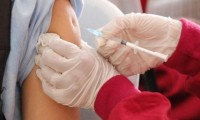-
Immune systems develop specific genes to fight against common bacteria, study finds
- Source: drugdu
- 129
- July 22, 2023
-
New protein found to help melanoma evade the immune system
- Source: drugdu
- 114
- July 7, 2023
-
‘Aging’ immune cell levels could predict how well we respond to vaccines
- Source: drugdu
- 99
- June 29, 2023
-
Researchers identify microRNAs associated with a weakened immune response to COVID-19
- Source: drugdu
- 113
- June 13, 2023
-
Uncovering cancer-immune system interactions could inform how patients respond to immunotherapy
- Source: drugdu
- 138
- June 11, 2023
-
More depressed patients than previously estimated could have increased activation of their immune system
- Source: drugdu
- 124
- June 1, 2023
-
Study maps immune responses produced by COVID-19 vaccination in First Nations population
- Source: drugdu
- 118
- May 31, 2023
-
Common diabetes drug could be repurposed as a treatment for autoimmune disorders
- Source: drugdu
- 134
- May 26, 2023
-
Ariceum and UCB link up to take on immune-related diseases
- Source: drugdu
- 121
- May 15, 2023
-
People with Long COVID neurological symptoms found to have differences in immune cell profiles and autonomic dysfunction
- Source: drugdu
- 157
- May 8, 2023
your submission has already been received.
OK
Subscribe
Please enter a valid Email address!
Submit
The most relevant industry news & insight will be sent to you every two weeks.













